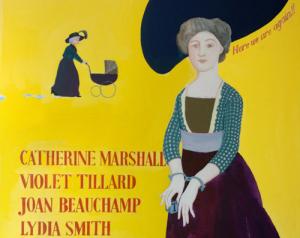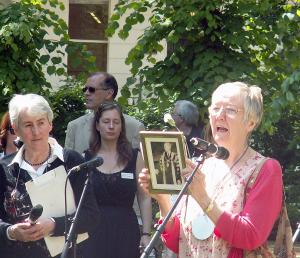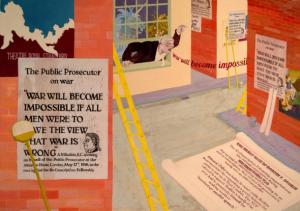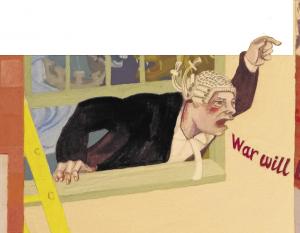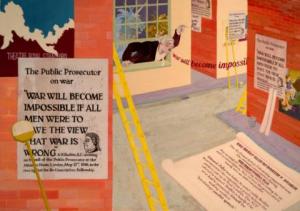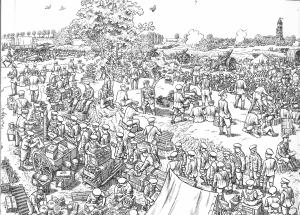By 1918, Britain’s No-Conscription Fellowship was led by women, as the male leadership was in prison. Catherine Marshall was a key organiser of the NCF. Joan Beauchamp was the official publisher of the NCF’s newspaper, The Tribunal, and Lydia Smith her secret co-editor, using a woman with a pram as a…
First World War
First World War
First World War
PHOTO: ALEX GERRARD/PAX CHRISTI
Watched by Valerie Flessati (left) of the First World War Peace Forum, at the 15 May Conscientious Objectors (CO) Day ceremony in Tavistock Square in central London, Cindy Sharkey (right) remembers her CO grandfather who refused to fight in the First World War.
A socialist member of the Independent Labour Party, Eleazor ‘Dil’ Thomas refused to participate in what he saw as a capitalist war, waged to preserve the empire. As well as remembering women war…
Adam Hochschild, author of 'To End All Wars' helped us launch the Peace News WW1 project 'The World is My Country' in January 2014 at Friends House in London.
Adam‘s book 'To End All Wars: A Story of the Loyalty and Rebellion, 1914 – 1918' is the major inspiration for The World is My Country
Lion tamers and agents provacateurs
The only recent account of the First World War to foreground the war’s…
In terms of economic mobilisation, Dr Glenford D Howe notes that, in the West Indies alone: ‘Gifts [in kind] to the value of several thousand pounds were contributed by the colonies to the war effort; these included sugar, rum, oil, lime, cotton, rice, clothing, logwood, and nine aeroplanes. A total of 11 ambulances and adequate funds for their maintenance were donated, and approximately two million pounds sterling was given to the British government and charities.’…
There are a lot of issues that are debatable about the First World War. There is one fact, though, that ought to be beyond debate, and which ought to be acknowledged on all sides in the national conversation during this centenary year.
Reasonable people can differ, for example, on how important imperial rivalry was in causing the war. What all reasonable people should agree on, however, is that if, by some miracle, the major European powers had managed to stabilise their relationships…
On 15 May, descendants of more than 30 First World War conscientious objectors will take part in this year’s International Conscientious Objectors’ Day commemoration in Tavistock Square, London.
One of the speakers on 15 May, Mary Dobbing, took part last year in the women’s peace delegation which visited the Afghan Peace Volunteers in Kabul. She also campaigns for justice for Palestinians in the footsteps of her CO grandfather, a Quaker teacher in the Middle East at the time of the…
Originally made for Peace News in 1966, 'Postcards Home' is entirely composed of postcards sent to and from the front during the First World War, both picture and text.
Skilfully directed by Dai Vaughan, it does not seek to evoke the physical reality of war so much as to hint at the breakdown of normal relationships and the inherent frailty of human attachments which such a breakdown reveals.
Film uploaded to Peace News's YouTube channel with the permission of Concord Media.…
This year’s centenary of the start of the First World War is accompanied by a tidal wave of events and commemorations. But one key aspect of the war’s history is likely to receive little or no attention: the history and stories of the people and organisations that opposed the conflict.
Moreover, this history – of police raids and buried documents, feminist peace initiatives and clandestine printing presses, striking German munitions workers and communities of…
Over 120 people squeezed into the Bloomsbury Suite at Friends House in London on 17 January to hear renowned US author Adam Hochschild talk about his book To End All Wars – the only recent account of the First World War to foreground the war’s opponents.
According to Hochschild: ‘The First World War changed the world for the worse in every conceivable way, but despite its folly and devastation people in Britain have one thing they should feel proud of. From 1914 to…
The First World War centenary (2014-2018) was accompanied by a tidal wave of events, exhibitions, TV series, books and commemorations. However, one key aspect of the War’s history received little attention: the history and stories of the people and organisations that opposed the conflict.
Moreover, this history – of police raids and clandestine printing presses, disobedient soldiers and feminist peace initiatives, Maori princesses and striking German munitions workers – appears to be…
In his 2011 book To End All Wars – the only recent account of the first world war to foreground the anti-war movement – Adam Hochschild asks: "If we were allowed to magically roll back history to the start of the 20th century and undo one – and only one – event, is there any doubt…
The received image of the British public’s reaction to the outbreak of the First World War is usually that of jubilant, flag-waving crowds, assembling in front of Buckingham palace to cheer the royals and sing the national anthem. On 5 August 1914, an editorial in The Times described the previous evening, saying that: ‘the streets were packed with cheering masses.… Flags were waved from cabs, omnibuses and private cars.’
Less-well-recorded is the fact that just two days earlier, an…
This is one segment of the outstanding 24-foot-long drawing by Joe Sacco of the first day of the battle of the Somme from his concertina book The Great War: July 1, 1916 (an illustrated panorama with an essay by Adam Hochschild. Jonathan Cape, 2013, 56pp, £20). At first, the mass of figures shuffling through trenches appear to be Where’s Wallys, then peering closer you see that they are all…
As we approach the hundredth anniversary of the First World War, an uncomfortable question raises its head. Why did so many millions succumb to ‘war fever’ in 1914? While there was a lot of reluctance and a fair amount of resistance to the war, the actual declaration of war spawned huge, wildly-excited crowds in the major capital cities and the fever claimed many liberals and left-wingers.
The emotions that overwhelmed these Europeans had little to do with hate…


